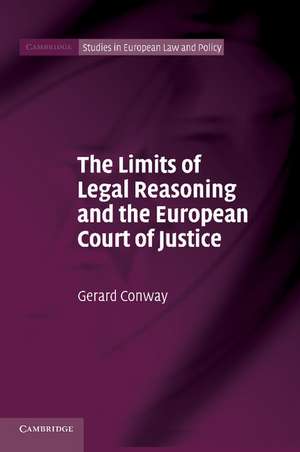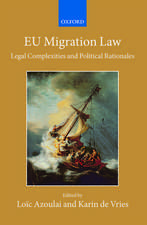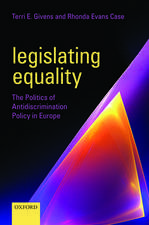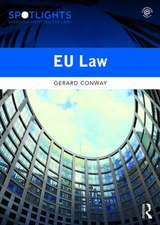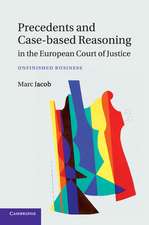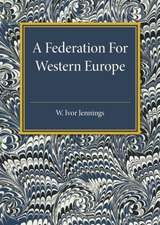The Limits of Legal Reasoning and the European Court of Justice: Cambridge Studies in European Law and Policy
Autor Gerard Conwayen Limba Engleză Paperback – 2014
| Toate formatele și edițiile | Preț | Express |
|---|---|---|
| Paperback (1) | 288.25 lei 6-8 săpt. | |
| Cambridge University Press – 2014 | 288.25 lei 6-8 săpt. | |
| Hardback (1) | 729.73 lei 6-8 săpt. | |
| Cambridge University Press – 11 ian 2012 | 729.73 lei 6-8 săpt. |
Din seria Cambridge Studies in European Law and Policy
-
 Preț: 253.81 lei
Preț: 253.81 lei -
 Preț: 231.88 lei
Preț: 231.88 lei -
 Preț: 252.21 lei
Preț: 252.21 lei - 9%
 Preț: 697.02 lei
Preț: 697.02 lei - 14%
 Preț: 725.57 lei
Preț: 725.57 lei -
 Preț: 309.87 lei
Preț: 309.87 lei - 14%
 Preț: 728.05 lei
Preț: 728.05 lei -
 Preț: 323.65 lei
Preț: 323.65 lei - 23%
 Preț: 728.63 lei
Preț: 728.63 lei -
 Preț: 285.37 lei
Preț: 285.37 lei - 11%
 Preț: 604.45 lei
Preț: 604.45 lei -
 Preț: 284.56 lei
Preț: 284.56 lei - 23%
 Preț: 757.77 lei
Preț: 757.77 lei -
 Preț: 338.80 lei
Preț: 338.80 lei -
 Preț: 321.65 lei
Preț: 321.65 lei -
 Preț: 285.54 lei
Preț: 285.54 lei - 14%
 Preț: 727.07 lei
Preț: 727.07 lei -
 Preț: 392.36 lei
Preț: 392.36 lei - 14%
 Preț: 785.32 lei
Preț: 785.32 lei -
 Preț: 284.17 lei
Preț: 284.17 lei - 11%
 Preț: 569.86 lei
Preț: 569.86 lei - 14%
 Preț: 721.13 lei
Preț: 721.13 lei - 23%
 Preț: 716.45 lei
Preț: 716.45 lei -
 Preț: 295.08 lei
Preț: 295.08 lei -
 Preț: 286.89 lei
Preț: 286.89 lei - 11%
 Preț: 557.26 lei
Preț: 557.26 lei -
 Preț: 284.78 lei
Preț: 284.78 lei -
 Preț: 386.54 lei
Preț: 386.54 lei - 14%
 Preț: 784.15 lei
Preț: 784.15 lei -
 Preț: 325.93 lei
Preț: 325.93 lei - 14%
 Preț: 1008.04 lei
Preț: 1008.04 lei - 11%
 Preț: 625.73 lei
Preț: 625.73 lei - 11%
 Preț: 427.12 lei
Preț: 427.12 lei
Preț: 288.25 lei
Nou
Puncte Express: 432
Preț estimativ în valută:
55.17€ • 57.37$ • 46.16£
55.17€ • 57.37$ • 46.16£
Carte tipărită la comandă
Livrare economică 15-29 martie
Preluare comenzi: 021 569.72.76
Specificații
ISBN-13: 9781107660359
ISBN-10: 1107660351
Pagini: 346
Dimensiuni: 152 x 229 x 18 mm
Greutate: 0.46 kg
Editura: Cambridge University Press
Colecția Cambridge University Press
Seria Cambridge Studies in European Law and Policy
Locul publicării:New York, United States
ISBN-10: 1107660351
Pagini: 346
Dimensiuni: 152 x 229 x 18 mm
Greutate: 0.46 kg
Editura: Cambridge University Press
Colecția Cambridge University Press
Seria Cambridge Studies in European Law and Policy
Locul publicării:New York, United States
Cuprins
1. Introduction and overview: interpretation and the European Court of Justice; 2. Reading the Court of Justice; 3. Reconceptualising the legal reasoning of the Court of Justice: interpretation and its constraints; 4. Retrieving a separation of powers in the EU; 5. EU law and a hierarchy of interpretative techniques; 6. Levels of generality and originalist interpretation in EU law; 7. Subjective originalist interpretation in EU law; 8. Conclusion.
Recenzii
'Conway's study is timely, well argued, intelligent and provocative … [His] highly intelligent book provides an excellent entry to the study of the decision making of the Court of Justice. He shows that the Court has a predisposition towards a meta-communautaire reading of the treaties in those cases where it matters most.' Gunnar Beck, International and Comparative Law Quarterly
'With the help of case studies of landmark decisions, Conway … demonstrates impressively where the reasoning of the Court on the interpretation of EU law seemed to fail to articulate alternative choices and thereby create a sense of inevitability of the Court's solution … [The] Limits of Legal Reasoning [and the European Court of Justice] is in my view definitely a much-needed, thought-provoking contribution to EU law scholarship, whether you find yourself in agreement with the Court's conclusions or not.' B. Pirker, European Law Blog (europeanlawblog.eu)
'Gerard Conway has … written an undeniably important book. Praise is due for his searching, tightly knit dissertation, which succeeds in rekindling a fire that has petered out too soon. The principal critique of the Court's creative jurisprudence is well founded, and his alternative theorems merit further scholarly discussion.' Henri De Waele, European Law Review
'Conway normatively discusses the limits of legal reasoning of the Court … Such a proposition might be perhaps difficult to digest in some of the more traditional quarters of EU law scholarship. It could be seen, however, rather than the indictment of what and how the Court has done in the past, as the suggested recipe for the future. Conway's own conclusion confirms that his main argument is prospective: in a transformed, differentiated and sceptical Union of today, the linear narrative of further integration translated into one-sided reasoning of the Court becomes more of a problem than a solution.' M. Bobek, European Law Review
'… well worth studying closely … based on thorough research and knowledge of the case law and of EU law, and also of the relevant literature.' Joxerramon Bengoetxea, European Constitutional Law Review
'With the help of case studies of landmark decisions, Conway … demonstrates impressively where the reasoning of the Court on the interpretation of EU law seemed to fail to articulate alternative choices and thereby create a sense of inevitability of the Court's solution … [The] Limits of Legal Reasoning [and the European Court of Justice] is in my view definitely a much-needed, thought-provoking contribution to EU law scholarship, whether you find yourself in agreement with the Court's conclusions or not.' B. Pirker, European Law Blog (europeanlawblog.eu)
'Gerard Conway has … written an undeniably important book. Praise is due for his searching, tightly knit dissertation, which succeeds in rekindling a fire that has petered out too soon. The principal critique of the Court's creative jurisprudence is well founded, and his alternative theorems merit further scholarly discussion.' Henri De Waele, European Law Review
'Conway normatively discusses the limits of legal reasoning of the Court … Such a proposition might be perhaps difficult to digest in some of the more traditional quarters of EU law scholarship. It could be seen, however, rather than the indictment of what and how the Court has done in the past, as the suggested recipe for the future. Conway's own conclusion confirms that his main argument is prospective: in a transformed, differentiated and sceptical Union of today, the linear narrative of further integration translated into one-sided reasoning of the Court becomes more of a problem than a solution.' M. Bobek, European Law Review
'… well worth studying closely … based on thorough research and knowledge of the case law and of EU law, and also of the relevant literature.' Joxerramon Bengoetxea, European Constitutional Law Review
Notă biografică
Descriere
Gerard Conway explains how judges of the ECJ should be understood as sharing the same interpretative perspective as the law-maker.
